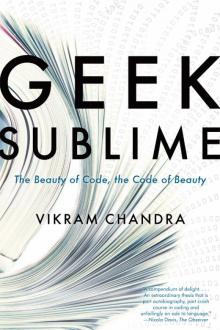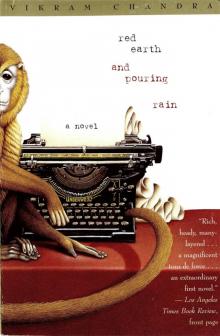- Home
- Vikram Chandra
Red Earth and Pouring Rain Page 8
Red Earth and Pouring Rain Read online
Page 8
I jerked up and was on my feet, a thin, painful sliver of fear arcing through my chest, trying to remember what had pulled me out of sleep. I rubbed my eyes. Tom was kneeling in front of the television, palms on the screen, a sheet wrapped around his body, his nose almost touching the electric blue.
“Tom, did you say something?”
The image on the screen changed and his face took on a white tinge. “Look,” he said. “It’s so beautiful.”
“What?”
I knelt next to him and pushed at his shoulder, trying to get a look at the screen. He moved a little, and I saw Mount Baldy, snowcapped, against a deep blue sky. The camera swept over the slopes, and they had some music playing, full of trumpets, and it was eternal and beautiful.
“It’s perfect,” Tom said, and his voice was full of longing and regret.
I lurched up and went across the room to the window. The plastic shade resisted as I tugged at it, and then something clicked and it snapped up on the roller, and there was Mount Baldy, golden in the first dawn, awesome and untouched and so very close.
“Tom,” I said. “Look. Look.”
He turned toward me, still holding the television set. I saw him blink, and then he stood up slowly and came to stand next to me at the window.
“Heaven,” Tom said. “It’s heaven.”
Then he leaned out over the concrete and began to shout, in a quick chanting rhythm that I seemed to recognize but couldn’t place: “Heaven, heaven, heaven.” I thought of trying to stop him but couldn’t stop laughing. I leaned out beside him, tasting the morning, and his elbow jogged against my side each time he bent forward to shout, then again as he came back with a long rasping intake of breath. It felt like a drumbeat. After a while I began to shout, too, softly at first, then louder as I discovered how good it felt: “Heaven, heaven, heaven.”
“Will you jerks please shut up?” John’s voice was sleepy, but it seemed to echo almost as much as ours. Maybe it was the air of that perfect morning, so rain-washed that I could see the trees on Baldy. “Please? Shut up?”
We stopped and turned into the center of the room, but the laughter wouldn’t stop, and we whispered to each other, falling into a circling dance, feet rising and falling: “Heaven, heaven, heaven.”
Outside, the edge of sunlight raced over the valley.
now
WHEN ABHAY FINISHED TYPING, he stood up, avoiding his parents’ eyes, and walked slowly out the door. Saira ran through the court-yard, telling the children the story-telling was over for the evening, and then she went after him.
Yama stood up and bowed at me, then melted away. I could hear the rising hubbub outside as the children rose to their feet and left. I became aware of a steady ache in my jaw and realized I had been grinding my teeth against each other all evening; I bent over and huddled on the bed, feeling the muscles in my thighs and shoulder twitch.
’Wasn’t that hard, no?’ Hanuman said. ‘Get rested. I’ll see you tomorrow’
’Thank you,’ I said. ‘Thanks to you all.’
’They can’t hear you, but no matter. They’re your friends.’
I rolled over and reached towards the typewriter, but someone extinguished the light and I felt my eyes close; when I awoke the moonlight made sharp patterns on the floor, and a cool breeze swept in through the window, smelling of jasmine. I pushed myself up. In a corner, a diffuse cloud of silver dust hung motionless; I climbed up to the window and craned my neck, but the hedge and heavy branches hid the stars. Slipping between the bars, I worked my way over the hedge and dropped to the ground.
As I swung through the trees I saw a lone figure on the maidan, walking slowly around the perimeter. It was Abhay: he was restless too. I watched him for a long time as I sat in a fork, as I tried to shape the past, to make something out of it. I suppose he was trying to do the same.
* * *
At precisely six o’clock the next evening Yama appeared in his black throne. The crowd outside was noisy and restless. I settled myself in front of the typewriter and cracked my knuckles.
’Wait,’ Hanuman said. ‘We can’t start without Saira.’
I typed out an enquiry, and Ashok shook his head and shrugged:
‘I don’t know.’
‘Who are all these people?’ said Mrinalini, who had been peering out. ‘They’re not all children, you know’
‘One of them must have told a favourite uncle or something,’ Abhay said, ‘and then of course everyone must have found out.’
‘What are we going to do?’ Mrinalini said. ‘It’s getting packed out there.’
There was a determined knock on the door. Mrinalini opened the door and then stepped back. Saira came in, face tear-stained, her hand firmly clasped by a large, fleshy woman dressed in a green salwarkameez, an older version of Saira herself.
‘Sister,’ she said to Mrinalini, ‘what is this Saira is telling me? She came home so late last night and I said, where were you, but she wouldn’t tell. Again this evening she was ready, very eager to go somewhere, so I said unless she told me…’ Then she saw me, sitting over the typewriter. ‘Oh, Allah, it’s true. A monkey. A typewriter.’
‘She wasn’t going to let me come,’ Saira said, wiping her cheeks with the back of a hand. ‘Mama, this is Sanjay. See, he types.’
Mama was staring at me, eyes bulging, caught half-way between horror and awe. So I typed: ‘Namaste, ji. I am Parasher. Your daughter has helped me in my time of need.’
She backed away, moving her head from side to side.
‘Mrinalini, what is this thing you have in your house?’
‘Zahira,’ Mrinalini said. ‘It’s all right. He’s nothing bad.’
‘How do you know? He could be anything.’
‘Hanuman’s here,’ Saira said. ‘Hanuman the Great.’
‘Sanjay’s done nothing bad yet,’ said Mrinalini.
Zahira looked at both of them, perplexed. I started to type again, but stopped as three loud crashes rang out in the court-yard, one after the other.
‘Mrinalini,’ said Zahira, ‘they’re knocking over your flower-pots.’ Glass crackled and splintered outside. ‘That was your sliding window. Who are these people?’
‘I don’t know. I’ve never seen them before.’
‘They’re not even from this mohalla. They can’t come into your house and do this. Come.’
Zahira left, followed by Mrinalini, and a moment later we heard Zahira’s voice lash out, and the court-yard fell silent. Smiling, Saira peeked out the door.
‘Saira, you stay in there.’ Saira ducked back in.
‘She’ll have them organized in a minute,’ Saira said.
‘Too neat,’ Yama said. ‘Much too timely’
‘The three crashes,’ Hanuman said, jumping down from his perch and stalking around the room, tail swinging restlessly, ‘the three crashes like three drum-beats rising to a crescendo, completed by the glass breaking, just in time to distract that lady, to make her a participant. Much too neat.’
‘Do you sense a hidden hand?’ Yama said, standing up.
‘A hidden something or other,’ Hanuman said. ‘But where? Where are you hidden, whoever you are?’
‘Who?’ I said. ‘What are you talking about?’
‘Someone who wants a story told,’ Yama said.
‘Someone who is bound to monkeys,’ Hanuman said, ‘but that’s me, and I’m already here.’
‘Judging by the timing and the rhythm of those crashes,’ Yama said, ‘an aesthete. A protector of poets.’
‘Too vague still,’ Hanuman said, ‘but apply logic; Yama, ratiocinate. I feel something, someone here; look at the hair on the back of my neck. But my blood is rising, like on a hunt; you are the cold one, the icy thinker. Think. You know your own methods; apply them.’
‘A protector of Parasher, and who is Parasher?’ Yama said, sitting down. ‘A sometime singer and poet, a lover, a fomenter of revolutions, a monkey. No. Nothing yet.’
‘Nothing,’
said Hanuman, leaping around the room, his tongue flicking in and out between his hard yellowed teeth. ‘Something, something, I smell something. Why are you so much trouble, Sanjay? Why did you come to this house, singer?’
‘Food,’ I said. ‘I was hungry. You can’t blame me for that.’
‘Food!’ Yama cried. ‘That’s it! You’re a thief, Parasher, a filcher of clothes, a robber, a pilferer, a rifler!’
‘Listen, calm down,’ I said. ‘I was only making a living.’
‘Thieves and poets,’ Hanuman said, ricocheting from the walls, eyes dark, ‘poets and thieves. And who is the fat patron of poets and thieves? All right, you fat snoot-face, where are you? Come on out, broken-tusk!’
There was a scraping behind the wall under the bookshelves, a rubbing of something over brick and wood, and Hanuman leapt at the wall, hand outstretched. His fist punched a hole in the wall (my friends watched the brick shatter, mouths open) and disappeared behind the plaster; for a moment, Hanuman struggled, pulling back, and then a nasal voice said: ‘All right, all right. I’ll come out.’
Hanuman eased away from the wall, and a small mouse backed out of the hole, its tail still gripped by the Wind-son’s fingers. A small figure hopped off the mouse’s back and took a few steps, growing larger with every step. My face curved in a ridiculous smile; I clapped my hands; I burst into laughter.
‘O snoot-face!’ I said. ‘O marvellous excellent fat one!’
Ganesha picked daintily at his shawl with plump fingers, until it lay just so, and his trunk twisted about his head and neck, adjusting the brilliant necklaces of unearthly stones and the crown of gold.
‘Do you have to be so rough, monkey?’ he said. ‘Uncouth.’
Hanuman was scratching the mouse between its ears, and he looked up, laughing. ‘What were you doing skulking inside walls, han?’ Hanuman said.
‘There was a story to be told, and so, naturally, I came. Even though people around here seem to have forgotten who I am.’
‘The remover of obstacles himself,’ Yama growled. ‘So it’s been you all along. Did you interfere with my scribes? Have you been casting spells, making things easy for this monkey-man here?’
‘Who, me?’ said Ganesha, looking innocently at the Death-lord with his sunken elephant eyes. ‘I haven’t done anything at all. I’ve only been here for the last minute or so.’
‘Thank you,’ I said, bowing to the son of Shiva. ‘Thank you.’
‘I did nothing,’ he said, his big grey head inscrutable, the ears flapping gently to and fro. ‘Come, nearly time to start.’
He settled himself on the bed, next to the typewriter. Saira hopped up onto the sheets and sat on the other side of the machine. The door opened, and Zahira and Mrinalini came in. I could hear faint whispers circling the court-yard.
‘I’m not sure about this still,’ Zahira said, putting a protective arm around her daughter.
‘Sister, it’s all right,’ Mrinalini said. ‘My son’s here too.’
‘Yes, he is, isn’t he?’ Zahira said, looking at Abhay curiously. ‘Well, Allah will protect. But only the children are in the house now; the rest of the crowd is outside, scattered on the maidan, and they want to listen to the story, too. Will you pass papers back and forth, from here to the court-yard, from there to outside? And it will be read here, and then there?’
‘It’ll never work,’ Ashok said. ‘You’re asking for confusion.’
Ganesha nudged me and whispered in my ear, and I typed: ‘Ganesha is here (we seek his blessing in our endeavours to attain wisdom and knowledge).’ I received another nudge, none too gentle, in the ribs (just as Saira squealed, ‘Ganapati baba moriya, Ganesha is here!’), and so I went on: ‘Ganesha asks if you have a stereo speaker and if you do you should put it on the roof, never mind about the wires.’
Instructions were sent out to the willing children for this to be done, while I explained to the rest of my family (I think I can use that word now) what had happened. They looked a little concerned: one god in the house is fine, I could see them thinking, and two is better, but three in a room is a lot of divinity in a very small place, and what if this trend is to continue? Can we expect to see the whole immeasurable pantheon in the near future, the shining hosts? Should we also prepare for visitations from the big hitters themselves (Ashok’s phrase), the heavy dudes (Abhay, edgy) and the boss ladies (Mrinalini, smiling) like Shiva and Parvati and Vishnu and Lakshmi and maybe even Brahma himself? That was a dizzying thought, and who can predict the actions of the mighty (Hanuman shrugged, Yama and Ganesha looked inscrutable), so I made reassuring noises and tried not to look nervous. The story-telling hour was drawing near.
Finally, the speaker was on the roof.
‘Let the child say something,’ Ganesha said.
‘Saira, say something.’
‘Say what?’ Saira said, and the words rang out clear as the chimes of a fine bell from the speaker above. Saira jumped, a hand clapped over her mouth. ‘One, two, three,’ she said. ‘Testing, testing, one, two, three.’ Her voice went right to the edge of the maidan and maybe a little beyond.
‘Obstacle removed,’ said Ganesha.
‘Don’t be smug, youngster,’ Yama said. ‘All right, Sanjay. Where were we?’
Where we were, god, was with Benoit de Boigne, in his journey across the seas, in his search for a dream.
So, I began to type, and Mrinalini read it all out.
Listen…
George Thomas Goes Overboard.
ON A MAIDAN, within sight of green mountains, Uday Singh and George Thomas exchanged cuts, the sound of their clashing swords echoing among the banyan trees and the water-filled fields.
George Thomas watched Uday Singh’s sleepy eyes and relaxed stance, listening to the other’s easy breathing and waiting for an opening. They circled each other, moving always to the right; Thomas felt the world recede, distanced by their revolutions, and saw only Uday’s white beard, the shimmering edge of his blade, the place where his tunic curled back to reveal the ridge of the collar-bone and the dimple at the base of the throat, and Thomas felt Uday’s presence, his spirit, his courage, his old wounds, his loves, his disappointments, his fear, felt that old unspoken intimacy, that sometimes obscene knowledge between adversaries, and waited for a secret wavering, an internal retreating that would reveal itself as an opening.
Thomas saw Uday’s eyes narrow, and suddenly saw a crack in his guard, felt Uday drop back, there it was; Thomas lunged forward, but even as his thighs clenched and his point reached out he knew it had been a mistake, because Uday moved lazily, slowly aside, avoiding the thrust easily and cutting from underneath in a scooping movement to tap Thomas gently on the stomach with smooth steel.
Thomas straightened up, panting.
‘How do you do that?’ he said. ‘You knew I was coming before I did.’
‘I could see you making up your mind,’ Uday said. ‘It’s not so hard. It comes with age.’ He thumped Thomas on the back. ‘You’re getting better. Your Urdu still needs work, though.’
As they walked back to the tents, they stripped off the heavy leather and chain mail armour that glinted in the late-afternoon sun. The grass under foot was wet with the first rains of the monsoon; in a red tent, Thomas ate, sitting cross-legged on the carpeted floor, and Uday watched.
‘Eat something,’ Thomas said. ‘Nobody’ll ever know’
‘The gods will know, and I will know,’ Uday said, smiling. ‘Eat, firangi.’
‘Firangi? Me? I’m no foreigner, I’m Jahaj Jung, old man, or haven’t you heard?’
‘Jahaj Jung, the warrior from the seas,’ Uday said, smiling. ‘That very man,’ Thomas said, ‘but here comes a firangi.’
The man who entered, stooping a little, was tall and thin, with long, lank dark hair and a large nose.
‘Reinhardt,’ Thomas said. ‘Sit. Eat.’
‘Later,’ Reinhardt said. ‘I have an idea. A plan.’ He lowered himself to the floor and poured wine into a cup
.
‘Get on with it,’ Uday said.
‘Of course,’ Reinhardt said. ‘The rains will set in soon, and we will languish in these muddy fields, no campaigning, no money to be earned. But not far away, there is a palace. There is a palace with a woman in it. A palace with a princess who needs officers for her brigades.’
‘Sardhana,’ Uday said. ‘You’re talking about Sardhana.’
‘Of course,’ Reinhardt said, grinning. ‘A beautiful woman, they say, a tempestuous woman, a hungry woman, a passionate woman.’
‘A witch,’ Uday said. ‘Zeb-ul-Nissa, the Witch of Sardhana. Daughter of a dancing woman. Married a general named Le Vassoult, who died. Now she rules his estate, with spells and terrors and a hand of steel.’
‘Will you come?’ Reinhardt said.
‘Of course he will,’ Uday said.
‘A beautiful woman?’ Thomas said.
‘Unquestionably,’ Reinhardt said.
‘A passionate woman?’
‘Undoubtedly.’
‘A tempestuous woman?’
‘Surely’
‘You’re crazy to go near her,’ Uday said. ‘She has the magic of the Brahmins, the hidden magic. But of course you have to go.’
‘A woman with an estate, a kingdom,’ Thomas said. ‘Too good to let go.’
‘You have to go,’ Uday said. ‘You would have to.’
‘Uday the fencer with the foresight,’ Thomas said.
‘Fencing or women, survival is the same thing,’ Uday said. He smiled. Jahaj Jung. Be careful.’
‘You aren’t coming?’
‘I have more sense than to go near a witch.’
‘Children’s stories,’ Thomas said.
‘Precisely the ones to be afraid of,’ Uday said.
The next morning Reinhardt and Thomas rode out. Uday waved good-bye from a ridge of mud between two fields, his white tunic transparent in the low slanting sunlight, his beard shifting slowly across his broad chest in the wet breeze. Reinhardt began to sing a French song in a thin, piping voice; Thomas twisted in his saddle, watching the straight-backed figure get smaller and smaller until it was hidden by a grove of heavy-topped mango trees; then there was the distant singing of women in the fields, the heavy sticky fall of hooves in mud, the creaking of leather, the call of thousands of crickets, the busy chirping of birds, and the distant rumble of thunder, the rolling black and grey of the clouds above.

 Love and Longing in Bombay
Love and Longing in Bombay Geek Sublime
Geek Sublime Sacred Games
Sacred Games Red Earth and Pouring Rain
Red Earth and Pouring Rain